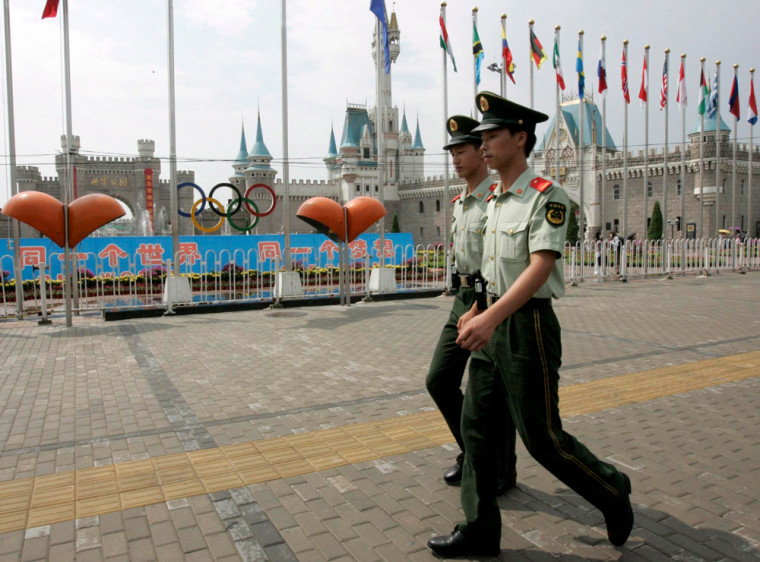Chinese authorities have not approved any of the 77 applications they received from people who wanted to hold protests during the Beijing Olympics, state media reported Monday.
The state-run Xinhua News Agency said the applications received since Aug. 1, a week before the games opened, were submitted by 149 people, including three from overseas. The complaints ranged from labor and medical disputes to inadequate welfare, it said.
But 74 of the applications were withdrawn because the problems “were properly addressed by relevant authorities or departments through consultations,” Xinhua said, citing an unidentified spokesman for the Public Security Bureau.
Two other applications were suspended because they did not provide sufficient information and one was rejected because it violated laws against demonstrations and protests, the spokesman said.
No further details were given. A woman who answered the telephone at the spokesman’s office of the bureau would not comment on the report.
Protests have become common in China, from workers upset about factory layoffs to farmers angry about land confiscation. But the communist leadership remains wary about large demonstrations, fearing they could snowball into anti-government movements.
The sensitivity is more marked during the Olympics, which China hopes will showcase the country as a modern power.
In July, China said protests would be allowed in three parks far from games venues.
But there were also rules to be followed: Applications with detailed paperwork must be filed five days in advance and protests must not harm “national, social and collective interests.” A response would be provided 48 hours before the requested rally time, officials promised.
This would make Tuesday the last day anyone could apply for permission to protest during the games.
“The clock is ticking for the Chinese government to demonstrate its good faith regarding these so-called protest zones,” said Phelim Kine, an Asia researcher for the New York-based Human Rights Watch.
But Wang Wei, vice president of the Beijing Olympics organizing committee, on Monday defended the protest plan to journalists, some of whom have pressed Olympic officials to show how China has improved human rights as it promised to do while bidding to host the games.
“This is not realistic,” Wang said. “We think that you do not really understand China’s reality. China has its own version and way of exercising our democracy.”
There have been no demonstrations in the designated areas since the games started, though small unregulated protests have occurred in other parts of the city. Most of them have been conducted by foreigners who were swiftly deported after unfurling “Free Tibet” banners.
In the past few days, human rights groups and families of people who have applied for permits to protest in the parks say some people were taken away afterward by security agents, prompting critics to accuse officials of using the plan as a trap to draw potential protesters to their attention.
Kine said Human Rights Watch wants more transparency on who the applicants were because there were “justifiable concerns about the whereabouts and safety of those individuals.”
Many petitioners, however, said it was more important to get their cause heard.
“China is presenting itself as a place with democratic freedoms where everyone has the right to protest, even during the Olympics, but in reality the protest permits won’t be granted,” Wang Wenjin, a 65-year-old from Hong Kong, said after he submitted his application.
Wang, who flew into Beijing on Monday, belongs to a group that represents Hong Kong business owners with investments in China who say they have encountered unfair treatment and corruption in the mainland. He said officials told him he hadn’t provided enough paperwork for an individual demonstration.
Also Monday, a dozen people applied for permits to protest about being forcibly evicted from their homes to make way for redevelopment projects.
As they gathered, plainclothes security officers videotaped them and took their photographs, a common method for Chinese authorities to keep track of dissenting voices and one that intimidates many Chinese.
“I have lived all over since I became homeless, including tunnels, warehouses, on the street, and the houses of friends and relatives,” Yang Shuangjun, 37, who lost his home in 2006, told AP reporters who were present. “What they have done to us is unlawful and unfair.”
Another petitioner, Sun Liwei, said she also has slept on the streets and relied on the kindness of friends since being kicked out of her home in 2005.
“My heart aches,” said Sun, a 52-year-old former teacher, her eyes filling with tears. “I have always believed in my government, even though I have lost everything. My possessions, my home, and my job were taken away from me. I don’t feel like a citizen anymore.”
